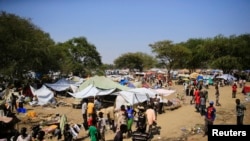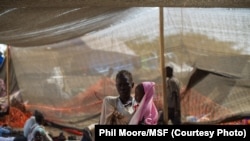JUBA —
South Sudan's information minister was refused access at the weekend to the United Nations compound in Bor, where some 10,000 people have sought shelter as heavy fighting between pro- and anti-government forces raged in the town, U.N. and army officials said Monday.
Ariane Quentier, the spokeswoman for the U.N. Mission in South Sudan (UNMISS), told VOA News that Information Minister Michael Makuei Lueth tried to enter the U.N. compound in Bor but was refused access because the two bodyguards accompanying him were armed.
She said none of the eight U.N. protection sites in South Sudan, which are currently providing temporary shelter to some 70,000 people who have been displaced by five weeks of fighting around the country, allow access to any outsiders carrying weapons.
Makuei's bodyguards reportedly threatened U.N. staff who refused them access to the camp, but eventually withdrew.
U.N. Secretary-General Ban Ki-moon said in a statement he was "disturbed" that United Nations personnel were threatened by members of the South Sudanese military during the incident, and demanded that all parties to the conflict in the young nation "respect the sanctity of UNMISS protection sites.”
Makuei could not be reached for comment, but South Sudan army spokesman Philip Aguer called the United Nations' refusal to allow a government minister to enter the camp astonishing, and said it raised questions in the minds of South Sudanese about the goings-on inside the camp.
"We are surprised if the United Nations can deny a host Minister of Information, the honorable Michael Makuei, who wanted to visit the United Nations camp. So people are wondering what was inside the U.N. camp that a minister of the incumbent government should not see,” Aguer said.
Quentier insisted that the United Nations is merely enforcing its own rules and trying to maintain a neutral position in the conflict, which pits supporters of President Salva Kiir against anti-government forces, most of whom back Kiir's former deputy, Riek Machar.
Makuei's attempt to visit the camp in Bor came as the two sides continued slow-moving peace talks in Addis Ababa while fierce fighting raged in parts of South Sudan.
The South Sudanese government said at the weekend that its forces have recaptured Bor, which is one of three provincial capitals that have been the scene of bitter battles between pro- and anti-government troops in the five weeks since the world's newest nation plunged into violence.
Authorities in Jonglei state said the provincial capital was reduced to rubble during the fighting.
Jonglei state's caretaker Governor John Koang Nyuon told VOA that nearly every building in the town was destroyed.
State Assembly Speaker Peter Chol Wal said looters ransacked his office, and appeared to be targeting official documents.
He said state officials will form a special committee to assess the damage but warned that it would probably take years to rebuild the provincial capital and the rest of the state.
"I think it will take time for rehabilitation of Jonglei state to get back to its place, like it was before," Wal said.
"I think it will take us three years because they were targeting the documents -- I think it will be very hard work," he said.
He said many people fled into the bush or swamps weeks ago to shelter from the fighting and were still too frightened to come out.
Government forces earlier this month recaptured the capital of Unity state, Bentiu, which a high-ranking U.N. official said has been wiped off the map by days of heavy fighting between the two sides, and Aguer said the army was preparing to launch an offensive to recapture Malakal, the capital of oil-rich Upper Nile state.
A source in Malakal, who asked not to be identified, told VOA last week that opposition forces were "in full control" of Malakal and were preparing to advance on two key oil-producing areas in Upper Nile, which produces around 85 percent of South Sudan's key revenue-generating resource.
More than half a million people have been forced from their homes by the fighting, and although no precise death toll is available, U.N. officials have said they believe many thousands of people have been killed.
Ariane Quentier, the spokeswoman for the U.N. Mission in South Sudan (UNMISS), told VOA News that Information Minister Michael Makuei Lueth tried to enter the U.N. compound in Bor but was refused access because the two bodyguards accompanying him were armed.
She said none of the eight U.N. protection sites in South Sudan, which are currently providing temporary shelter to some 70,000 people who have been displaced by five weeks of fighting around the country, allow access to any outsiders carrying weapons.
Makuei's bodyguards reportedly threatened U.N. staff who refused them access to the camp, but eventually withdrew.
U.N. Secretary-General Ban Ki-moon said in a statement he was "disturbed" that United Nations personnel were threatened by members of the South Sudanese military during the incident, and demanded that all parties to the conflict in the young nation "respect the sanctity of UNMISS protection sites.”
Makuei could not be reached for comment, but South Sudan army spokesman Philip Aguer called the United Nations' refusal to allow a government minister to enter the camp astonishing, and said it raised questions in the minds of South Sudanese about the goings-on inside the camp.
"We are surprised if the United Nations can deny a host Minister of Information, the honorable Michael Makuei, who wanted to visit the United Nations camp. So people are wondering what was inside the U.N. camp that a minister of the incumbent government should not see,” Aguer said.
Quentier insisted that the United Nations is merely enforcing its own rules and trying to maintain a neutral position in the conflict, which pits supporters of President Salva Kiir against anti-government forces, most of whom back Kiir's former deputy, Riek Machar.
Bor 'destroyed' in fighting
Makuei's attempt to visit the camp in Bor came as the two sides continued slow-moving peace talks in Addis Ababa while fierce fighting raged in parts of South Sudan.
The South Sudanese government said at the weekend that its forces have recaptured Bor, which is one of three provincial capitals that have been the scene of bitter battles between pro- and anti-government troops in the five weeks since the world's newest nation plunged into violence.
Authorities in Jonglei state said the provincial capital was reduced to rubble during the fighting.
Jonglei state's caretaker Governor John Koang Nyuon told VOA that nearly every building in the town was destroyed.
State Assembly Speaker Peter Chol Wal said looters ransacked his office, and appeared to be targeting official documents.
He said state officials will form a special committee to assess the damage but warned that it would probably take years to rebuild the provincial capital and the rest of the state.
"I think it will take time for rehabilitation of Jonglei state to get back to its place, like it was before," Wal said.
"I think it will take us three years because they were targeting the documents -- I think it will be very hard work," he said.
He said many people fled into the bush or swamps weeks ago to shelter from the fighting and were still too frightened to come out.
Government forces earlier this month recaptured the capital of Unity state, Bentiu, which a high-ranking U.N. official said has been wiped off the map by days of heavy fighting between the two sides, and Aguer said the army was preparing to launch an offensive to recapture Malakal, the capital of oil-rich Upper Nile state.
A source in Malakal, who asked not to be identified, told VOA last week that opposition forces were "in full control" of Malakal and were preparing to advance on two key oil-producing areas in Upper Nile, which produces around 85 percent of South Sudan's key revenue-generating resource.
More than half a million people have been forced from their homes by the fighting, and although no precise death toll is available, U.N. officials have said they believe many thousands of people have been killed.


